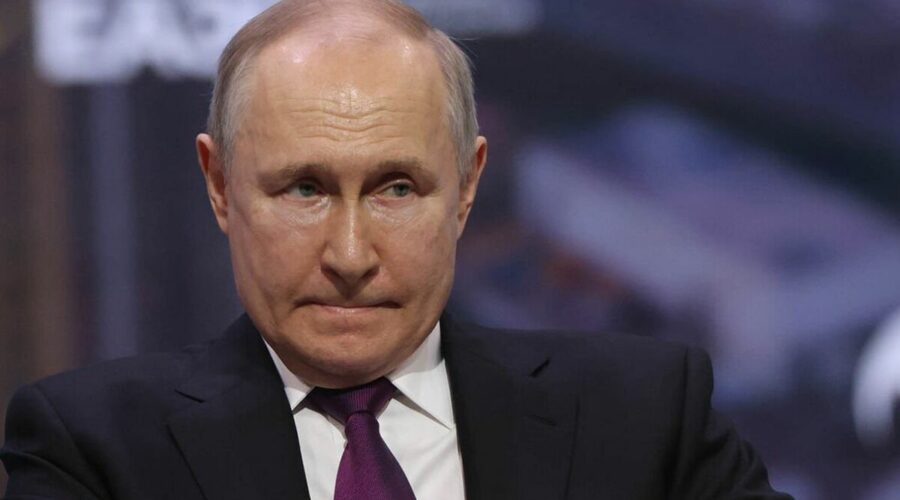Russian economy ‘collapsing’ while Putin treats his people as ‘objects’

The life chances and economic potential of Russians “will continue to collapse” due to the choices made by the current regime, an expert has claimed. Russian President Vladimir Putin has failed his fellow citizens by not spending the foreign investments once pouring into the country on the wellbeing and development of Russia, John Bryson, professor at Birmingham University, told Express.co.uk. The resources that could have boosted, for instance, the healthcare and civilian industry sectors went instead into war campaigns which, followed by the Western sanctions and reduced foreign investments, sparked economic crises.
The Chair in Enterprise and Economic Geography at Birmingham Business School told Express.co.uk: “If you look at Russia’s economy, it’s really quite interesting, as soon as Putin annexed Crimea, Russia’s economy began to collapse.
“Russia moved up from being a medium-income country to being a high-income country, and in 2014 it shifted back down to being a middle-income country.
“So the life chances and the economic potential of the average Russian since 2014 has collapsed and will continue to collapse with all the various sanctions and waste of investments that Putin has put into this war.”
As noted by the expert, in February 2014 Moscow’s troops annexed Crimea and started interfering in eastern Ukraine.

The EU, the US and Canada responded at the time by issuing three types of sanctions – including restricting access to Western financial markets and services for designated Russian state-owned enterprises in a number of sectors, the embargo on exports to Russia of designated high-technology oil exploration and production equipment and an embargo on exports to Russia of designated military and dual-use goods.
In the last months of that same year, Russia’s oil prices fell sharply, an effect which, combined with the sanctions, caused significant pressure on the value of the Rouble.
In the first quarter of 2015, the country entered recession, with a GDP growth of -2.2 per cent compared to the same period in the previous year.
Professor Bryson vividly expressed how he thinks the Russian population was wronged, saying: “I was writing op-eds in February and March last year, in which I was basically talking about the tragedy of the Russian people.

We use your sign-up to provide content in ways you’ve consented to and to improve our understanding of you. This may include adverts from us and 3rd parties based on our understanding. You can unsubscribe at any time. More info
“And the tragedy of the Russian people is that they have a leadership that is not concerned in any way about the average Russian.
“They are only interested in the elite that are in control and are in governance.
“So the average Russian is an object that can be herded into war, the death and destruction of those Russians is completely unimportant, because they supposedly can be replaced.”
Had funds been properly invested into the country and its people rather than war and the elites, Professor Bryson believes Russians would be enjoying a quality of life similar to that of prosperous nations.
Don’t miss…
Ukraine ‘loses’ exploding land mines as they float downstream after dam breach[INSIGHT]
Putin’s ‘fascist’ successor will be worse with Wagner chief ‘waiting in wings'[REPORT]
BBC TV crew forced to flee as Russian shells rain down during interview[CLIP]

He said: “If all of that investment had been put into enhancing the life chances the average Russian, the average Russian could be as prosperous and well off as the average Singaporean.”
During 2022, the year Moscow launched a full-scale invasion of Ukraine, Russia’s economy contracted by 2.1 per cent, the federal statistics service in February.
In mid-May, the office reported a near two per cent fall in GDP during the first quarter of 2023 when compared to the same period in 2018.
While despite the sanctions Russia has managed to return to pre-conflict levels of crude oil exports, mostly thanks to sales directed at India and China, data released in April showed oil revenues in March were 43 per cent down year-on-year when compared to figures from 2022.

While Russia appears more resilient than forecasted when official data are considered, sanctions effects appear to be felt by the population.
In late May, it emerged a Russian business association called for the introduction of a six-day working week to offset the impact of the punitive measures enforced by the West.
Russian households appear to be feeling the squeeze too when considering Moscow’s official statistics regarding retail sales, which at the end of last year were almost 10 per cent lower in comparable prices than in the same period the year prior.
Similarly, data shared by the Association of European Businesses on Russian car sales showed a 58.8 per cent collapse in 2022 as the industry struggled to source parts and establish new supply chains following the imposed sanctions.
Source: Read Full Article

